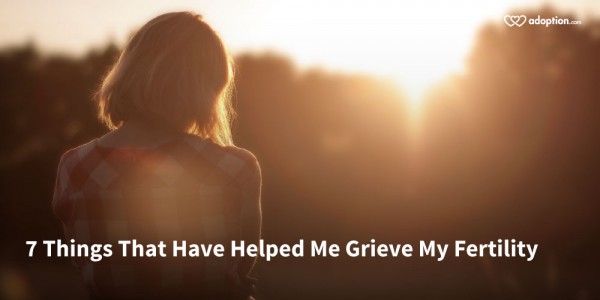Like so many people, my husband and I began exploring alternative ways to build out family after we found that we were infertile.
Specifically, I was infertile.
I am still, in fact, infertile.
I was always interested in adoption, in that it seemed like something we could do after we had a couple of children biologically, were older and wiser, and knew how to be parents.
As it turns out, we could not have children biologically, so without being older or wiser or knowing exactly what we were doing, we found ourselves looking for a new path to our family. Through the bustle of getting licensed and being placed with our first three children, it was easy to mostly ignore the hurt that I had carried with me for so long.
But I found that this feeling, this familiar less-than feeling, would creep in. At the park when the conversation turned to birth stories or breastfeeding; at the doctor’s office when I had to fill out forms and name myself “foster mother” or answer “unknown” to the most basic of questions about my child’s history.
Adopting cured my childlessness, which was the most painful symptom of my infertility. That is so, so true. But the fact that I am infertile remains. Grieving my fertility, mourning the experience of carrying a child and giving birth, is a process I am still going through.
1. Forgiving myself. I find myself even still, illogically, feeling guilt over having not birthed my children; somehow in my mind, had I been able to conceive and carry them, I could have spared them the rough start they had in this world and any pain that may come from that as they grow. Of course, of course, this makes no sense. Their start in this world and the circumstances of their births—these are things beyond my scope. What’s more, these things all contribute to their unique story.
2. Accepting my body the way it is. I spent years before infertility wishing my body were different than it was. When I discovered that I wouldn’t be having biological children, that wishing for something different evolved into a deep, dark contempt. Not being able to do this simple thing that seemingly everyone else could made me feel broken and worthless. I still struggle with this, honestly. I don’t think there’s a quick solution, but I can say that over time, it is getting better. Snuggling my children when they are sick and providing them comfort, running with them in the park—simple things like these remind me that this body of mine, with all of its flaws, has value separate from fertility.
3. Taking Time for Myself. This includes making time for the gym, regular Girl’s Night Outs, and occasionally binge watching 30 Rock on Netlix, yes. More importantly (although those things are very important), it means continuing to care for myself and the larger health problems that contribute to my infertility. After I my childlessness was cured, I was so relieved to not be thinking about fertility treatments anymore, and not deciding how to build our family anymore, that I actively ignored my PCOS and endometriosis for many months. This was not healthy, I know this now. Being a mother didn’t make my health challenges go away, and neither did ignoring them. Getting back to the doctor and coming up with a plan for how to care for post-infertility, which also happens to be mommy-me, greatly improved my energy, stress levels, and overall health.
4. Talking about it. Almost every time I decide to be brave in a group and open my mouth about being infertile, someone in the room focuses in and sighs with relief, “Me too.” Some of the most impactful conversations I’ve had in life have started here. Not talking about infertility perpetuates the feeling that it’s something to be ashamed of.
5. Finding a community. After realizing the benefit of talking about my infertility, I knew I had to do it more. A friend recently told me that when we met for the first time—while I was becoming licensed to be a foster parent—I gave her a 30 second rundown of my fertility and parenthood status immediately after telling her my name. I was clearly on the lookout for people who got it, who shared out experience. Having friends who understand the struggle with infertility, who have also adopted, or who are foster parents has been so healing. I may not have anything to contribute when conversations turn to pregnancy and birth, but knowing that I have someone to call when I find out I need surgery for my endometriosis or to discuss our new case worker is invaluable.
6. Refusing to dwell on “why.” It’s so easy to wonder why someone else can get pregnant and why I can’t, or why my children had to go through what they did. I have realized that constantly asking why isn’t productive, and the circles it sends me in won’t bring answers.
7. Not feeling guilty for needing to grieve my fertility. I am now, miraculously and thankfully, mother to four beautiful children. They have a safe home to call their own, and our family is happy. I am still infertile. It has taken so much for me to accept that I am allowed to grieve my own fertility despite having a beautiful family—that it isn’t selfish, and it doesn’t mean I’m not endlessly thankful for my children. It’s mourning the experience of pregnancy and learning to accept and love myself.
Have you experienced infertility? What has helped you grieve?

